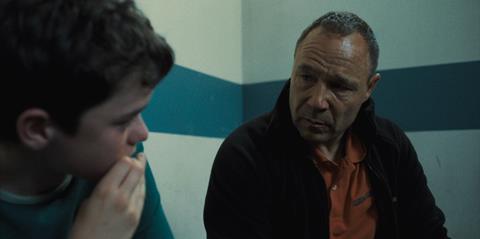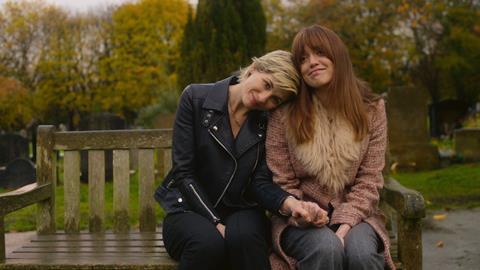As a COBA report shows UK-US scripted co-commissions are stable, executive director Adam Minns urges measured analysis over alarmist statements
The current debate over the health, or otherwise, of the UK drama sector is often divisive: domestic production is the underdog hero, global giants the villains who’ve abandoned the co-production market. But the UK TV sector is a complex ecosystem, and this drama has at least three twists.
The first twist is that co-commissions between domestic and overseas players are stable. Published this week, analysis for COBA of the BFI figures for high-end TV production found that co-commissions numbered 28 in 2024, compared to 31 in 2023. Last year, total co-commissions outweighed the number of single commissions from any one player.
The second twist is that co-commissions between PSBs and US streamers and studio groups shot up. Far from vacating the partnership business, as some feared, the big US companies co-commissioned 27 shows with PSBs last year, compared to 19 in 2023. The problem was not the US, but Europe. Co-commissions with European partners halved.
Should we be worried? Co-commissions with Europe fluctuate dramatically, but perhaps European broadcasters are struggling. Or is this a Brexit hangover? I don’t have that answer, but these are the questions we should be asking, instead of blaming streamers for everything.
None of this is to suggest domestic production is not under real pressure, as Jane Featherstone, Pact, and others have articulated. These are challenging times and we need new voices to emerge and homegrown stories to be told. The enhanced tax credit for independent film has been successful, and may offer a precedent for boosting grassroots TV drama. We should consider it.
Yet, in addressing this funding challenge, we must avoid measures or obligations that risk damaging overall investment. This is a deeply mixed ecology. Ofcom, which has done ground-breaking work on this, reports there is more funding in PSB drama from third-party sources than from PSBs themselves – £499m in 2023, the latest available year. Within that, COBA’s analysis shows that non-PSB streamers and broadcasters contributed a record £143m to co-fund PSB drama. That’s over and above their own first-run UK commissions (circa £1.5bn in 2023, not including sport, according to Ofcom), plus their inward investment. These levels of investment – and how they intertwine – set the UK apart from many countries.
And contrary to recent suggestions, this includes a commitment to training. Productions accessing the high-end tax benefit pay into the TV Skills Fund, which has raised £35m in ten years. That makes non-PSBs significant contributors to one of the sector’s biggest training funds.

Does this dilute British culture? I’d bet the PSBs involved in those co-commissions would argue fiercely they retained creative control. And, as Apple TV+’s Slow Horses and Netflix’s Toxic Town show, non-PSB commissions can be culturally British. Speaking in parliament last week, Sarah Owen MP said Netflix’s Adolescence, “is rightfully forcing a national conversation about the dangerous content seen by young men and boys, with fatal consequences”.
Do we need a sense check on ‘inward investment’?
I promised at least three twists, though. Our analysis of co-commissions showed that, by volume, 21% of high-end TV inward investment productions are PSB dramas. I thought that must be a mistake. Inward investment means global shows which could shoot anywhere, right?
Turns out, under the BFI’s definition, BBC period drama King and Conqueror, Channel 4’s cyber-thriller The Undeclared War, and ITV’s detective show Grantchester were among the 21 PSB dramas classed as inward investment. Even 5’s beloved All Creatures Great And Small was included. Is nothing sacred?
There’s a valid reason for this: they’re co-commissions and may not have happened without third-party investment. But to be devil’s advocate, if one added those shows to the domestic category instead of the inward group – after all, they are PSB commissions that count towards public service obligations – high-end domestic productions would have outnumbered inward investment shows 93 to 79 last year.
In other words, domestic and global production is even more interconnected than we thought.
To make an evidence-based case for intervention, we need to understand – and acknowledge – this complexity. This is crucial to demonstrating a return on investment, which government will require now more than ever. It would be good to see if the BFI could build on its outstanding work in this area by removing co-commissions from both the inward and domestic categories, and either adding them to its existing strand for statutory co-productions made under treaties, or creating a separate grouping.

Most of all, instead of division, let’s find ways to support those parts of the sector that need support without dampening investment from others. That’s not just because we’d damage overall growth, but because the different facets of our industry are so interlinked that harming one area could well exacerbate the problem we’re trying to fix. Wouldn’t that be a nasty twist?
- Adam Minns is executive director of COBA, the Association for Commercial Broadcasters and On-Demand Services








No comments yet